PHYSICAL ABILITIES TEST
BRIDGE, BUILDING & TRACK
-
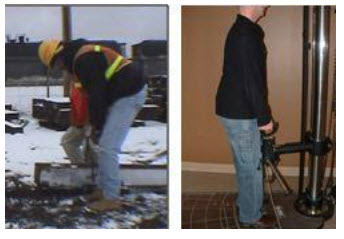
Tie Tong Lift
Employees occasionally have to lift and place a tie with tongs during their day. Applicants must demonstrate the ability to apply the force to accomplish this task. During this test applicants will pull towards their bodies with both hands against the handles on the testing apparatus.
-

Tie Tong Lift
Employees occasionally have to lift and place a tie with tongs during their day. Applicants must demonstrate the ability to apply the force to accomplish this task. During this test applicants will pull towards their bodies with both hands against the handles on the testing apparatus.
-
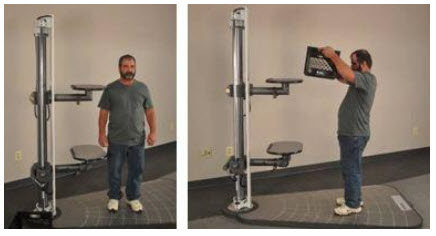
Dynamic Lift - Waist to Over Shoulder
On the job, a variety of objects are lifted onto a train car. Applicants must demonstrate the ability to lift and set a progressively loaded weight to a height over their shoulder. During this test, applicants will be lifting a crate between two shelves.
-

Dynamic Lift - Waist to Over Shoulder
On the job, a variety of objects are lifted onto a train car. Applicants must demonstrate the ability to lift and set a progressively loaded weight to a height over their shoulder. During this test, applicants will be lifting a crate between two shelves.
-
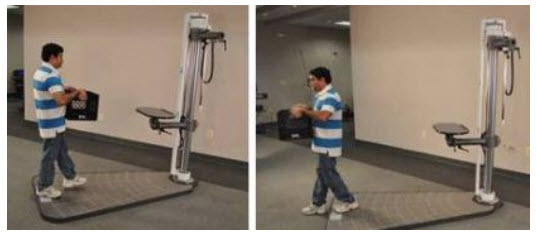
Dynamic Carry
Throughout the day, employees carry a variety of objects weighing different amounts. Applicants must be able to carry heavy objects in a safe and efficient manner. During this test, applicants will be lifting and carrying a crate. Applicants will lift the crate off a shelf and carry it 10 feet, turn around, and then return the crate to the shelf.
-

Dynamic Carry
Throughout the day, employees carry a variety of objects weighing different amounts. Applicants must be able to carry heavy objects in a safe and efficient manner. During this test, applicants will be lifting and carrying a crate. Applicants will lift the crate off a shelf and carry it 10 feet, turn around, and then return the crate to the shelf.
-
Upper-Level Reach
Employees are required to reach overhead when performing maintenance work. They may be required to work with their hands overhead for extended periods of time, with the ability to change position as needed. Applicants must demonstrate their ability to work in this position safely. During this activity applicants will be asked to move pegs from one panel to the next panel and back for a set number of repetitions.
-
Upper-Level Reach
Employees are required to reach overhead when performing maintenance work. They may be required to work with their hands overhead for extended periods of time, with the ability to change position as needed. Applicants must demonstrate their ability to work in this position safely. During this activity applicants will be asked to move pegs from one panel to the next panel and back for a set number of repetitions.
-
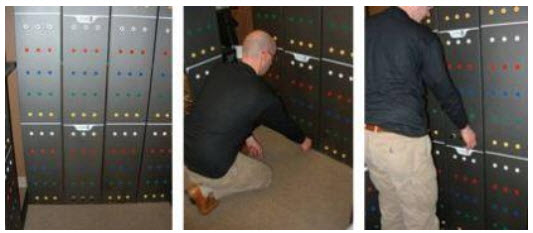
Kneel to Stand to Kneel
Employees are required to perform welds and other track maintenance. They often kneel for periods of time to accomplish these tasks. Applicants must demonstrate their ability to work in this position safely. Applicants will move pegs from the bottom row of a panel through each row to the top row and then back to the bottom row for a set number of repetitions.
-

Kneel to Stand to Kneel
Employees are required to perform welds and other track maintenance. They often kneel for periods of time to accomplish these tasks. Applicants must demonstrate their ability to work in this position safely. Applicants will move pegs from the bottom row of a panel through each row to the top row and then back to the bottom row for a set number of repetitions.
-
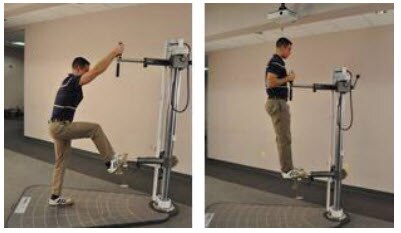
Natural Step Up
Employees are occasionally required to step up and down off a train car throughout their shift. Applicants must demonstrate the ability to do this task in a safe manner. Applicants must step up onto the step with both feet, once leading with their left foot and once leading with their right foot.
-

Natural Step Up
Employees are occasionally required to step up and down off a train car throughout their shift. Applicants must demonstrate the ability to do this task in a safe manner. Applicants must step up onto the step with both feet, once leading with their left foot and once leading with their right foot.




